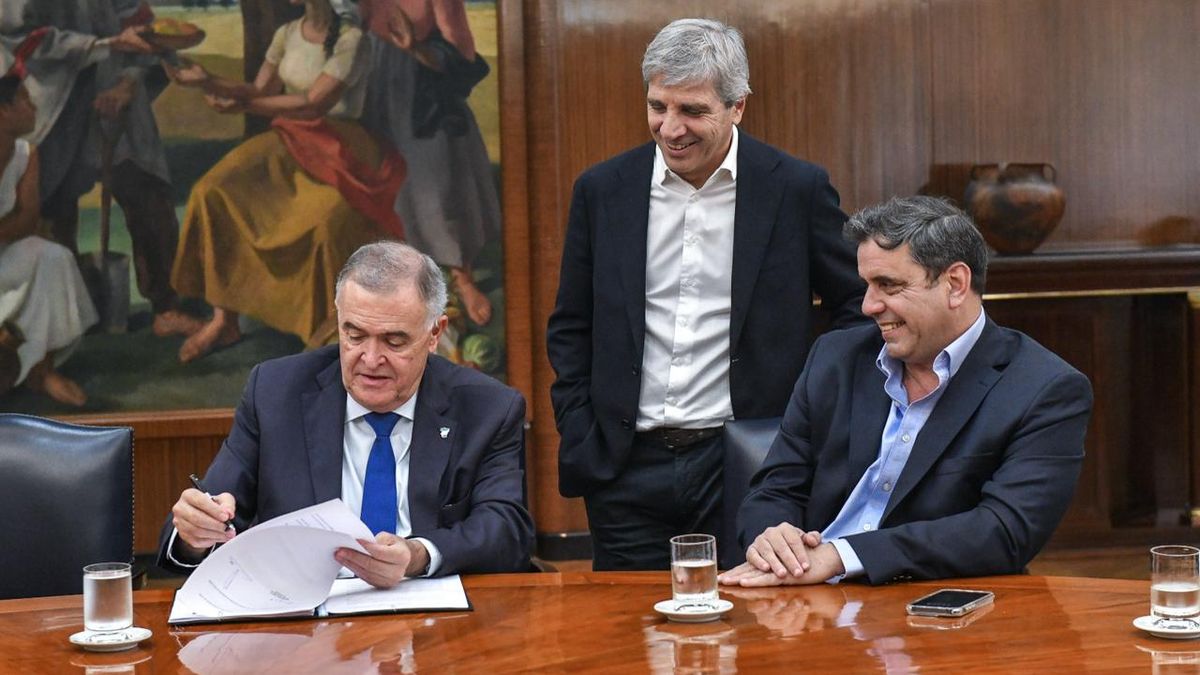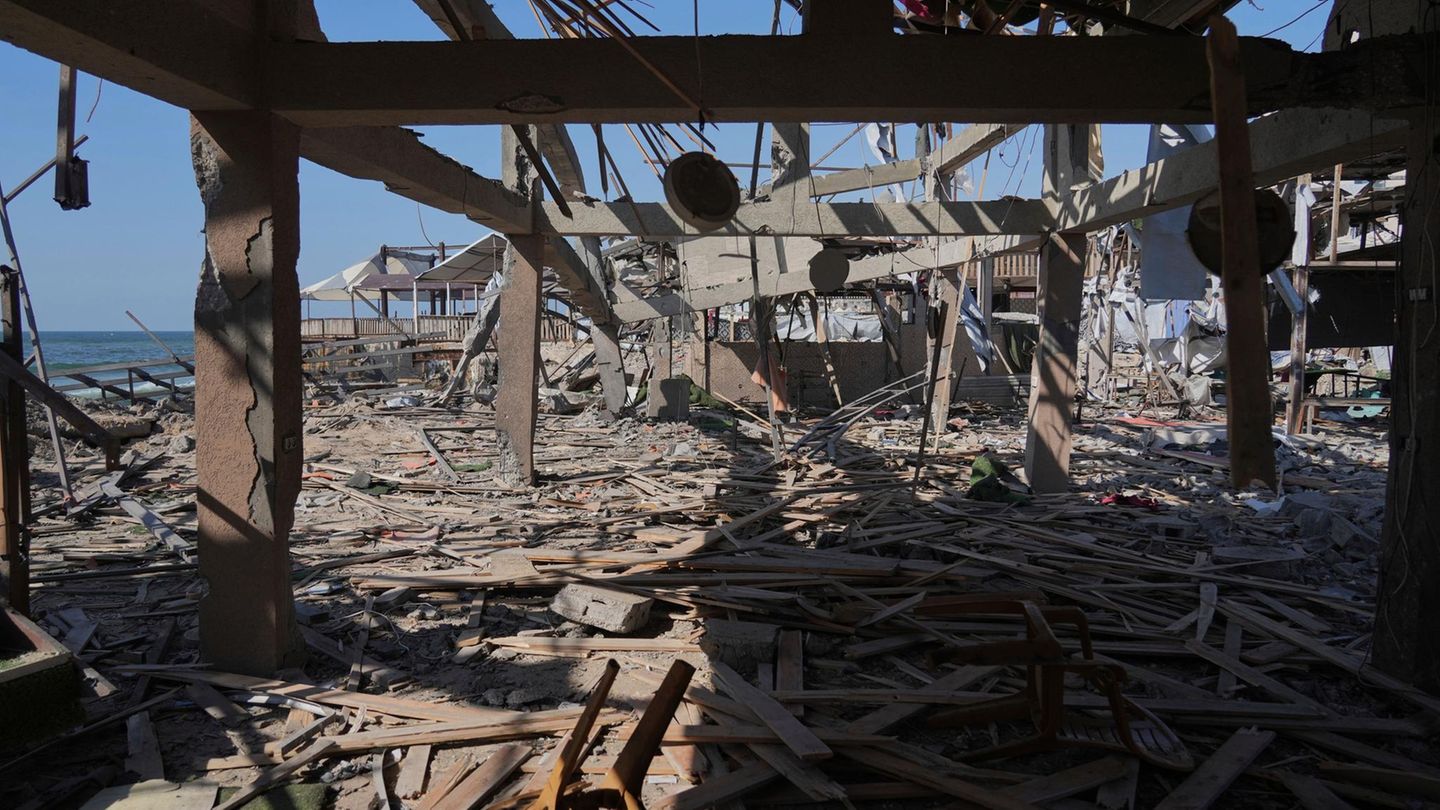There are 18 provinces that signed with the Nation the adhesion to the Regime of Extinction of Reciprocal Obligations to make a “clean slate” with the debts that the Government has with these administrations in different concepts. The stagnation of the treatment of the 2025 Budget in Congress and the almost zero possibilities of the issue being included in extraordinary sessions facilitated the yes of the governors, in need of some way to obtain resources. Tucumán and Córdoba advance, while Catamarca secured strategic mining resources.
Last week, the Minister of Economy, Luis Caputoand the deputy chief of staff Lisandro Catalánreceived the governors at the Treasury Raul Jalil (Catamarca), Leandro Zdero (Chaco), Rogelio Frigerio (Entre Ríos), Sergio Ziliotto (La Pampa) and Osvaldo Jaldo (Tucuman), to sign the letters of intent after the voluntary adhesion of the provinces to the regime created by Decree No. 969/2024. In subsequent days, they expressed this same willingness to work on simplifying debts and credits between the Nation and the provinces, the governments of Chubut, Córdoba, Corrientes, Jujuy, Mendoza, Misiones, Neuquén, Río Negro, Salta, San Juan, San Luis , Santa Cruz and Tierra del Fuego.
“The main objective of this regime is to end crossed conflicts and advance their resolution with dialogue and consensus between the parties. The aim is to agree on compensations, conciliations, transactions, recognitions, referrals and any other operation that tends to determine and cancel reciprocal debts,” it was pointed out from the Casa Rosada. The operation will essentially consist of the Government handing over lands, routes or companies to settle liabilities it maintains with the provinces.
From kilometer zero of the administration of President Javier Milei, the provinces claim debts for withholding tax on liquid fuels that the Nation makes but does not transfer, items for public works – for agreements that were signed and breached -, the payment of the Compensation Fund of the Fiscal Consensus and the Trust Funds for Provincial Development, Regional Infrastructure and the National Teacher Incentive Fund, among others. In most cases, governors are assisted by reason because these are funds allocated by laws that the Executive Branch fails to comply with, under the justification of applying the “chainsaw” to take care of national resources and achieve “zero deficit.”
One of the first to sign the agreement was Jaldowith the idea of not being left empty-handed and is already managing that the centenary and operational one passes for the provincial administration “Bartolomé Miter” railway stationof the Argentine Central Railway, which is located almost in the center of the capital of Tucumán. Once the legal and technical engineering of the pass is completed, the Government House would promote commercial and real estate development on the property and there would already be national companies interested.
Separately, this district also sharpens the pencil for the provincialization of the 3,000 housing units of the now defunct PROCREAR Program that were abandoned and without national financing. The Minister of Economy of Tucumán, Daniel Abad, and the Secretary of Territorial Development, Habitat and Housing of the Nation, Rodrigo Aybar, have already signed a letter of intent for the transfer of the property and the works, but the calculations that would enter the Regime remain. of Extinction of Reciprocal Obligations. Once this is concluded, it will be Jaldo’s management who will have to find financing for the mega housing project.
Feints
Córdoba was one of the last provinces in which the Legislature approved the local Executive Branch’s project to adhere to the “clean slate” system. Unlike Tucumán, one of the main obstacles of the Nation with the governor Martin Llaryorais the claim through different means – including judicially, before the Supreme Court of Justice of the Nation – of debts owed by the Retirement Fund. From the Docta it is pointed out that the Nation owes them $700,000 million. To this figure, the Córdoba government adds some $890,000 million for non-payment of works that the province ended up financing, in addition to another $600,000 million for items and programs of a different nature. Until today, there was no agreement.
Although it was reported from the Government House that there was no official request, from the Casa Rosada it was the head of the Cabinet of Ministers himself, Guillermo Francos, who admitted in November that Governor Llaryora was interested in having the Argentine Aircraft Factory “Brig. San Martín” SA (FADEA) provincialized.. In this way, he brought to the surface a negotiation that was taking place far from anyone’s eyes. Since then, no one denied that the dialogue on this issue has been canceled.
Llaryora’s interest is because the aircraft factory has a high strategic value for carrying out its tasks with cutting-edge technology and competes with firms in the same field in Latin America. For example, it excels in the assembly of wind turbines, in addition to its characteristic pieces of fuselages, wings, stabilizers, control surfaces, hydraulic and fuel pipes, electrical wiring harnesses and electronic systems. The participation of the provincial State would allow Llaryora to have resources that the Nation no longer guarantees.
Embed – https://publish.twitter.com/oembed?url=https://x.com/catalanlisandro/status/1867588432374960459&partner=&hide_thread=false
Jalil took advantage
The Catamarca governor Jalil was another of those who signed with the Nation and achieved strategic passes, such as the mining establishment of Minas Capillitas and control over the appointment of the presidency of the YMAD mining company.
“The agreement with the Nation was historic because it was possible to include two strategic actions for the future of our province and the mining sector,” described the president. Regarding the transfer of the Minas Capillitas establishment, it will change hands with all of its personnel, functions, competencies, services and tangible and intangible assets to be operated by the provincial state mining company Camyen. And as for Yacimientos Minerales Aguas del Dionisio, the new board of directors of the mining company will modify its composition and will have three representatives from Catamarca and two from the National University of Tucumán, without intervention or participation of the national State. While the distribution of YMAD funds will be 60% for Catamarca and the remaining 40% for UNT, “without conditions on their destination,” it was clarified.
It was also agreed that more than 500 real estate properties owned by the National State will be transferred to the Province, which have a total tax valuation of more than $9,000 million. The Catamarca Executive established priorities for these properties, which include locations such as Senasa, Chagas and ANSES, although the vast majority are still part of INTA.
Source: Ambito




